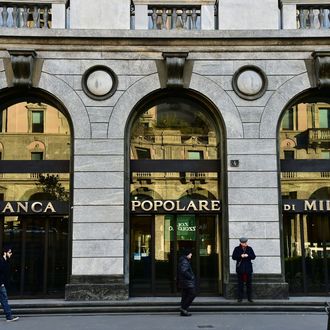
Italian banks are sitting on a heap of bad loans — and Britain just voted to throw a match onto the pile.
A full 17 percent of loans held by Italian banks have turned sour, The Wall Street Journal reports. At the height of the 2008 financial crisis that figure never exceeded 5 percent for U.S. banks. In total, Italian banks are holding on to €360 billion in impaired loans — quadruple their 2008 level.
To stabilize its financial system, the Italian government has sought the European Union’s permission to channel €40 billion of taxpayer funds into its banks. But the other EU leaders are giving Italy the red light. In deference to populist outrage over the postcrisis bank bailouts, the bloc adopted a rule in 2014 that requires a troubled bank’s stakeholders — shareholders, bondholders, certain depositors — to take a financial hit before taxpayers are asked to open their wallets.
But in Italy, an unusually high percentage of those stakeholders are individual investors, many of them elderly. These aren’t well-heeled speculators who can foot the bill by auctioning off their second yachts. When four small Italian banks fell into crisis last year, 100,000 Italian investors saw their holdings erased. A national controversy ensued following reports that a retiree committed suicide after losing €110,000 in savings. At present, retail investors hold roughly €187 billion in Italian bank bonds. If those investors see large swaths of their savings wiped out, it could take down Italian prime minister Matteo Renzi’s government.
This is where Italy was before the British went to the polls on June 23. After 52 percent of the U.K. voted to leave the EU, the nation’s financial headache has bloomed into a migraine.
Brexit hurts Italy’s banking system in at least three ways. First, the uncertainty unleashed by the referendum will likely slow growth across the continent. Italy’s business lobby group Confindustria has already revised the nation’s 2016 growth forecast downward. Slower growth could cause even more bad loans to pile up in Italian banks.
Second, Europe’s central banks are expected to respond to flagging growth by keeping interest rates low, thus decreasing the profitably of the bloc’s banks. Since the Brexit vote, an index of European banks has dropped 17 percent. Italy’s banks have long been among the least profitable in Europe, and, as the Journal notes, they’re especially vulnerable to the squeeze of low interest rates — unlike their peers in the U.S. and U.K., Italian banks perform little in the way of fee-generating services like asset management and investment banking.
Finally, one of Italy’s largest banks, Banca Monte dei Paschi di Siena, is trying to sell off a giant package of bad loans to a foreign partner. Several bankers tell the Journal that the uncertainty kicked up by the Brexit vote will make that sale far more difficult.
If Italy’s banking system falls into full-blown crisis, it could have ripple effects, both economic and political. The nation will hold a referendum on a package of constitutional reforms no later than October. In a recent note, Citibank described that referendum as “the single biggest risk on the European political landscape this year among non-UK issues.” If a weakened economy inspires Italian voters to reject the reforms backed by Prime Minister Renzi, it would empower the country’s own Euroskeptic party, the Five Star Movement, and force the word “Italexit” into everyone’s vocabulary.
“There is an epidemic, and Italy is the patient that is sickest,” Pier Paolo Baretta, an undersecretary at the Italian Economy Ministry, told the Journal. “[If] we don’t stop the epidemic, it will become everybody’s problem … The shock of Brexit has created a sense of urgency.”






























